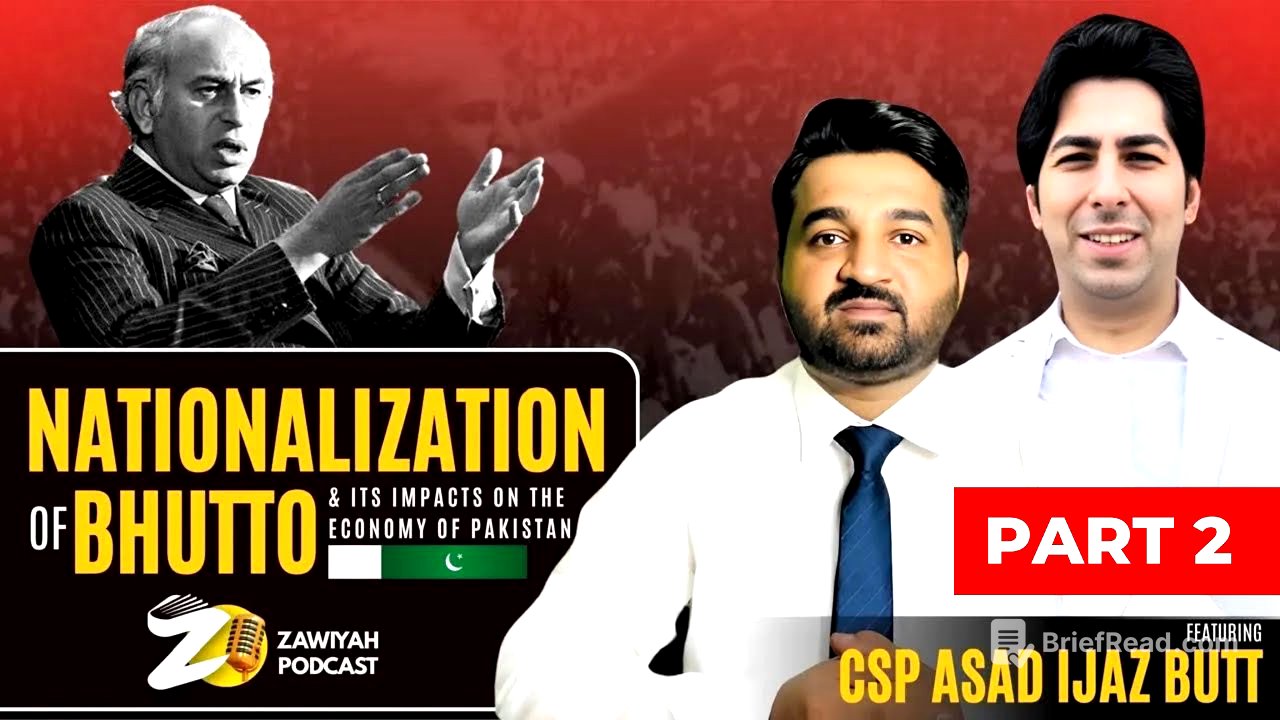TLDR;
This discussion analyzes Zulfiqar Ali Bhutto's (BH) era in Pakistan, focusing on the political motivations behind his policies, particularly nationalization, and their impact on various segments of society. It explores the characteristics of Pakistan's bureaucracy, the role of labor unions, and the influence of global politics on BH's strategies. The conversation also touches on the perception of BH as a leader, his relationship with religious factions, and the centralization of power during his rule.
- BH's policies had political motivations, including patronage and collaboration to gain legitimacy.
- Pakistan's bureaucracy has historically been characterized by rent-seeking and politicization.
- BH's nationalization policies mirrored the existing bureaucratic system and did not necessarily alleviate poverty.
- BH used Islam to create a divide within the religious right, gaining favor with some groups while alienating others.
- Nationalization led to centralization of power, but provinces were already weak before this policy.
Analyzing Bhutto's Political Motivations and Bureaucratic Impact [0:00]
The discussion begins by examining the political motivations behind Zulfiqar Ali Bhutto's (BH) actions, including political patronage, rent-seeking, and collaboration with certain classes to solidify his legitimacy. These characteristics are not unique to the Bhutto era but are reflective of Pakistan's civil service and bureaucracy even today. The nationalization of industries under BH, while intended to move Pakistan towards a socialist economy, mirrored the existing colonial and often "rotten" bureaucratic system. This meant that the same inefficiencies, red tape, nepotism, and politicization plagued the nationalized industries, hindering their productivity and economic growth.
Bhutto's Economic Policies and Their Limited Impact on Poverty [4:07]
The conversation shifts to whether BH's policies genuinely improved the lives of marginalized classes. Nationalization alone would not eliminate poverty without a proper redistribution of resources. Despite political slogans, there was little concrete action to address marginalization, and large-scale development projects take time to redistribute resources effectively. By the 1977 elections, BH had lost considerable ground, partly due to a strong opposition alliance, the Pakistan National Alliance (PNA).
Bhutto's Popularity, Geopolitical Context, and Relationship with Religious Factions [6:38]
The discussion addresses the perception of BH's popularity and the reasons for his downfall. While BH was a charismatic leader who effectively used political institutions to his advantage, his popularity had waned by 1977. BH's era occurred during the Cold War, but Pakistan was not as strategically important to the US as it had been in previous decades, leading BH to align more closely with China and the Muslim world. He used these relationships to bolster his domestic politics, such as organizing the first Muslim conference in Pakistan. The PNA, an alliance of Islamic parties led by Maulana Mufti Mahmud, branded BH as anti-Islam, contrasting his Western education and lifestyle with their religious image.
Bhutto's Use of Islam and the Divide Within the Religious Right [14:14]
The conversation explores BH's relationship with religious factions. Despite some clerics initially supporting BH after his second amendment to appease the religious right, he eventually fell out with them. BH's Islamic gestures created a divide within Pakistan's religious community. Some Islamic groups remained ambivalent, acknowledging BH's contributions to Islam, while others, forming the PNA, opposed him. BH successfully used Islam to gain favor with some Islamic groups through initiatives like the 1973 constitution and the OIC summit.
Centralization of Power and Provincial Dynamics During Bhutto's Era [17:36]
The discussion examines the centralization of power during BH's rule and its impact on the provinces. Nationalization was a centralizing project, but Pakistan was already a unitary state with a strong center before 1973. While nationalization added to this centralization, it did not significantly alter the power dynamic between the center and the provinces, as the provinces were already weak. The lack of industrial expansion to provinces like Balochistan and KP could have created inter-provincial economic disparities. The absence of prominent provincial leaders during BH's era further underscores the dominance of the central government.









